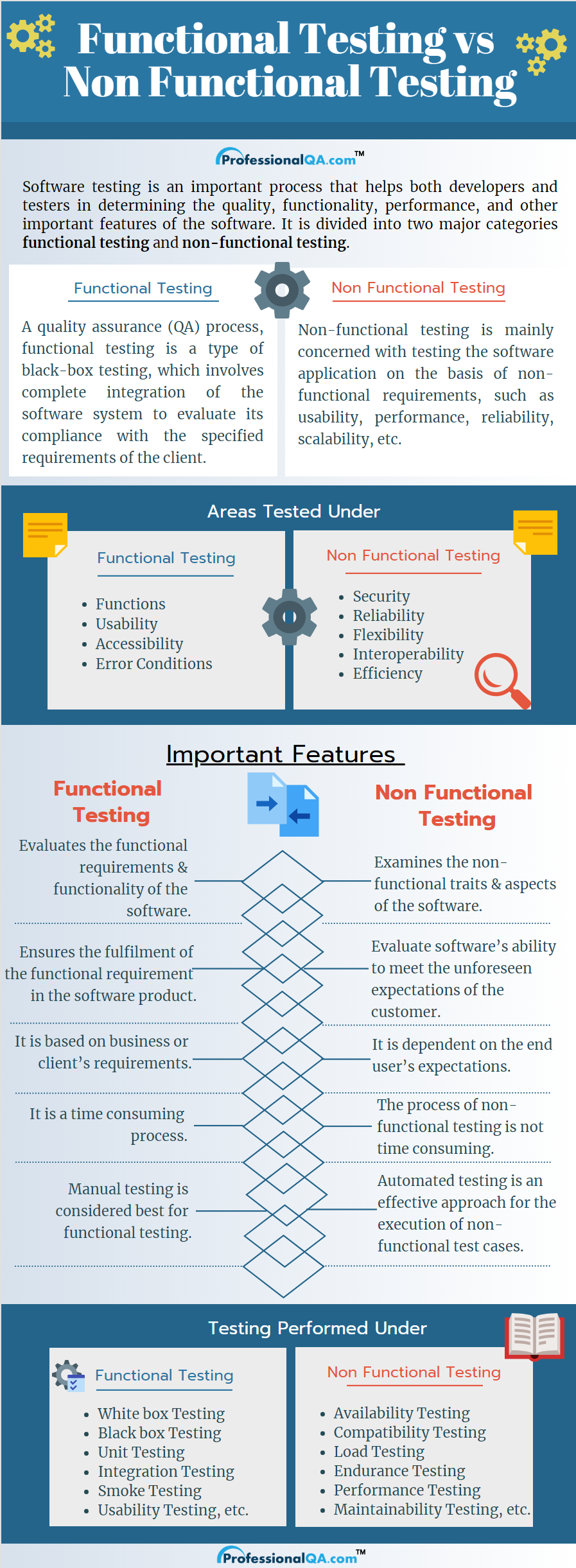

Software testing is an immensely important process that helps both developers and testers in determining the quality, functionality, performance, and other important features of the software. Divided mainly into two testing categories, functional testing and non-functional testing, it tests not only the basic requirements of the software, but also ensures it compatibility, reliability, scalability, security, etc. To understand the process of testing in general, it is vital for us to know all about functional & non-functional testing. Therefore, here are points of differences between functional testing vs non-functional testing for your reference.
A quality assurance (QA) process,functional testing is a type of black-box testing, which involves complete integration of the software system to evaluate its compliance with the specified requirements of the client. Functional testing evaluates the performance of individual functions of a software application and ensures that its various components & features work as intended in the real world and meet the requirements & specifications of the client & their business. Hence, the test cases prepared for functional testing are based on the specification of the software component under test, which test application against client’s business requirements.
Performed either manually or with the assistance of automated tools, during the process of functional testing, testers test how well the system performs as well as its core functions, text input, installation, setup, usability, and more. Functional testing is an immensely valuable testing technique for validating that the output of the application is in compliance with the client’s requirements.
As it is stated above, during the process of functional testing various factors that determine the functionality and performance of the application are tested. These can be categorized into four types, which are mentioned below:

A contrast of functional testing, non-functional testing is mainly concerned with testing the software application on the basis of non-functional requirements, such as usability, performance, reliability, scalability, etc. The objective of this testing is to test the readiness of the application as per the non-functional requirement, which are overlooked during the process of functional testing. Moreover, it evaluates the competency & effectiveness of the application under various load and conditions. During this type of software testing, the prime focus of the tester’s is on validating impeccable user experience.
With the assistance of non-functional testing, software engineers are able to optimize the way product is installed, setup, executed, managed, and monitored. Non-functional testing is as important as functional testing as it helps reduce the production risk and cost, which are associated with the non-functional aspects of the product. Additionally, non-functional testing plays a major role in ensuring that the quality attributes of the software product are identified correctly.
While performing non-functional testing, software testers are focused on testing application against the non-functional requirements. Here, the prime objective of testing is to ensure optimum user experience. Therefore, some of the parameters tested by non-functional testing are:
Though immensely different from each other, functional testing and non-functional testing, both are vital part of Software Testing Life Cycle (STLC) as they assist testers various important features and components of the software product, such as its quality, functionality, performance, and more. Hence, performing functional testing and non-functional testing is extremely important for testers to ensure that customers get remarkable user experience, with innovative and unique features.
Advertisement: